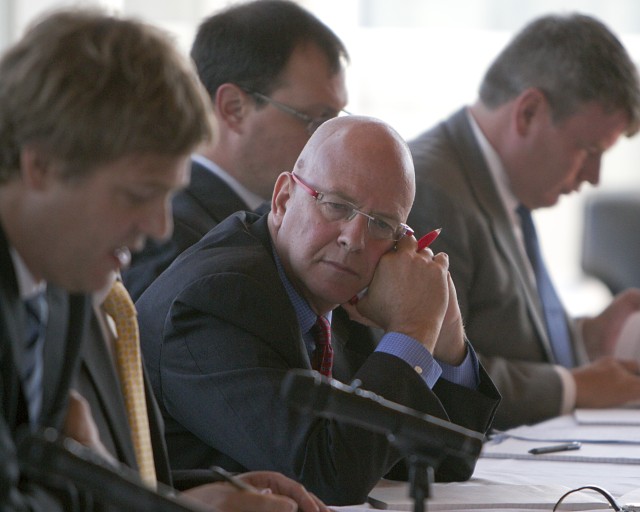
WEST POINT, N.Y. (Sept. 29, 2010) -- The U.S. Military Academy Department of Law and the West Point Center for the Rule of Law recently hosted one day of the Telford Taylor Memorial Conference. The conference, a three-day event held at both Columbia Law School and West Point, brought together legal experts from around the world to compare military law and jurisprudence with that of international criminal law.
The event was held in conjunction with the Journal of International Criminal Justice Board of Directors Meeting. The JICJ, universally recognized as the world's pre-eminent publication on ICL, is led by renowned judge and scholar Antonio Cassese. The Journal's Board is a basic "Who's Who" of the ICL community.
Col. Maritza Ryan, professor and head of the Department of Law, welcomed the 65 participants to West Point and emphasized the need for the military legal community to work in concert with their ICL counterparts.
"The conference is aptly named for Brig. Gen. Telford Taylor," Ryan said, "a man renowned for both his work with military law in Courtroom 600 in Nuremberg, Germany, and then with the development of ICL while a member of the faculty at Columbia Law."
The first panel was chaired by Judge O'Gon Kwon of the International Criminal Tribunal for the former Yugoslavia. Meeting in the Haig Room on the top floor of Jefferson Library, the panel debated whether international tribunals such as the International Criminal Court or the ICTY are the proper venue for war crime trials as opposed to national courts.
Professor Amos Guyora of Utah Law School was the most provocative presenter. Guyora proposed that national courts are the answer, but not in their current form. He detailed a new type of court modeled after the Foreign Intelligence Surveillance Act courts to hold secret trials of war criminals.
Professor George Fletcher of Columbia Law argued that the U.S. Constitution precluded using any type of secret court to adjudicate guilt or innocence.
The second panel was chaired by retired Maj. Gen. John D. Altenburg, the first convening authority of the Guantanamo military commissions. This panel evaluated whether war criminals should be brought to civilian courts, military courts-martial or military commissions.
Col. Mark David "Max" Maxwell of the Army Judge Advocate General Corps provided a detailed analysis of the recent historical and legal development of military commissions and argued that as long as they continued to be "... limited in scope, transparent in process, and respectful of the accused's rights," that military commissions can serve as the "... showpiece of American jurisprudence rather than its nadir."
Professor Salvatore Zappala of the University of Florence, Italy, added that international rights and procedures need to be followed.
Perhaps the most excitement generated by the panel was when Fletcher asked the military members of the panel when the Army would apologize for the internment of Japanese Americans during World War II.
Professor Gary Solis, Adjunct Professor for D/Law, countered that the Army had nothing to apologize for, as the civilian government had ultimately ordered the internments and has already apologized.
The third panel was chaired by Professor Mordechai Kremnitzer of Hebrew University of Israel. Held at Columbia Law School, this panel focused on the differences between how U.S. military law and ICL address criminal liability.
Cadets majoring in Law and Legal Studies and 22 select Columbia Law students from the Global Alliance Program attended the sessions.
Professor Kevin Govern, an alumnus of D/Law, returned from Ave Maria Law School in Naples, Fla., to participate in the conference.
He labeled it the "... best run and most meaningful conference" he had ever attended. Further, the JICJ Board was so impressed with the quality of the papers presented that they voted to dedicate an entire special edition of the Journal to the conference.
"Events such as this, to include our upcoming conference on Gender Justice in April 2011," Ryan said, "epitomize the continuing role of the West Point Center for the Rule of the Law as the world leader in the analysis and development of legal issues affecting the military and society."

Social Sharing